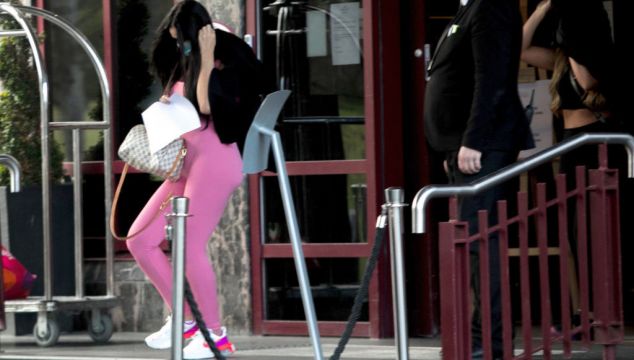The Supreme Court has reserved judgment in two women's appeal against the High Court's refusal to halting their prosecution for allegedly refusing to quarantine at a hotel during the Covid-19 pandemic in 2021 following their return to Ireland from a holiday in Dubai.
Niamh Mulreany (27) and Kirstie McGrath (32) have challenged the delegation of certain powers to the Minister for Health who during the pandemic had required persons coming from certain states to undergo mandatory quarantine on their arrival into this jurisdiction.
Last year Ms Justice Marguerite Bolger dismissed the two women's application for orders preventing their proposed prosecution before the District Court, for alleged breaches of measures introduced during the pandemic from proceeding.
The two successfully appealed that decision directly to the Supreme Court.
Following the conclusion of submissions before the Supreme Court on Thursday, the Chief Justice Mr Donal O'Donnell said the court was reserving judgement, and would give judgment at a later date.
The two were arrested at Dublin Airport on Good Friday, April 2nd 2021 on their return from the UAE, where they claim they had intended, but ultimately did not to undergo cosmetic surgery.
At the time, they and most other passengers arriving from certain designated countries, which had included the UAE, were required to undergo mandatory quarantine at a hotel for up to 14 days. The measures were introduced to help prevent the spread of the virus.
Both women refused to go to the hotel claiming that they could not afford the cost of stay, estimated at over €1,800 each, and that they needed to get back to their children.
They claimed they had only had child-minding arrangements in place for the time they were away.
Following their refusals to quarantine, both were charged with breaches of the 1947 Health Act, and if convicted face fines of up to €2,000 and a period of several months' imprisonment.
They claim the charges against them are unconstitutional and they launched judicial review proceedings against the DPP, represented by Kate Egan Bl, the Ministers for Foreign Affairs and Health, Ireland and the Attorney General, represented by Michael Cush SC and Katherine Donnelly SC.
The respondents all oppose the appeal and argue that the High Court's decision should remain undisturbed.
Opening the appeal John Fitzgerald SC, appearing with Mark Lynam SC and Keith Spencer Bl for the applicants said the case was not about the concept of the measures of having to quarantine at a hotel but was about the "manner in which the measures were introduced and implemented by the respondents.
The two claim the Minister for Health's designation of certain states, as places from where persons who travel to Ireland had to undergo mandatory periods of quarantine, breached the separation of powers, the principle of law and was unconstitutional.
The measures should have been introduced by way of legislation and not by way of a Ministerial order.
They also allege that there was a lack of a legally permissible appeals process for those who were undergoing the mandatory quarantine.
As part of the appeal, the Supreme Court, comprised of the Chief Justice, Ms Justice Elizabeth Dunne, Justice Brian Murray, Mr Justice Maurice Collins and Ms Justice Aileen Donnelly have been asked to determine several questions.
The questions include if Article 40.4 of the Constitution, which guarantees the right to liberty, cures any constitutional defects in the regime being challenged, or if the pandemic justified the measures adopted by the Minister for Health.
The court has also been asked if it is permissible under the Irish Constitution for the Oireachtas to delegate certain powers allowing the Minister for Health to make regulations.
It has further been asked to consider the constitutionality of the appeals process contained in the quarantine requirements.
In its ruling last year, the High Court found that the measures clearly provided for the designation of states for mandatory quarantine to be done by way of a decision made by the Minister for Health.
This power was not intended to be done by regulations, the lower court held.
The Oireachtas determined that it was in the public interest for the Minister to be able to designate persons coming into the country from a particular state for mandatory hotel quarantine, the High Court also found.
The applicants also claim that the appeal process was unconstitutional or that Article 37 of the Constitution had been breached, were also rejected by the High Court.
In March 2021 the two friends travelled to Dubai to celebrate "landmark birthdays" that had been paid for by their relatives and friends.
Ms McGrath of St Anthony's Road, Rialto Dublin 7 and Ms Mulreany Scarlett Row, Essex Street West, Dublin 2 had intended to undergo cosmetic surgery procedures in the UAE, but ultimately did not go through with the planned procedures.
While abroad, the State introduced quarantine requirements for persons entering the state from countries including the UAE.
Despite testing negative for the virus when they returned, they refused to quarantine.
They were arrested and charged with breaching Section 38 of the Health (Amendment) Act 2021 due to their refusal to go the designated hotel.
They were granted bail by the District Court the day after their arrest but were unable to take it up because they could not afford it.
They were detained at Mountjoy women's prison, before being released from prison following a High Court hearing and were taken to a hotel where they remained in quarantine for several more days.
At the hotel they engaged in the State’s appeal process, which were unsuccessful.







